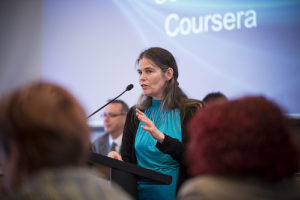The number of students enrolled in MOOCS, massive open online courses that are offered free, has increased dramatically over the past year.

At EWA’s National Seminar, Daphne Koller, co-founder of Coursera, a leading MOOC provider, said enrollment in their classes jumped from 700,000 in February 2013 to more than 3.4 million students in May.
Only a third of MOOC takers are in the United States, according to Koller, with enrollments spreading worldwide, especially in countries where higher education opportunities are limited.
However, in the midst of the MOOC enrollment explosion, the debates over the academic quality of their courses and whether these classes should be eligible for college credit have also grown.
In the EWA conference session “Higher Ed—What to Make of MOOCs,” Bob Samuels, president of the University Council-American Federation of Teachers, said he had major concerns about the growing MOOC movement.
“My main issue is this (MOOCs) is a big distraction,” Samuels said. “There are many (MOOC companies) that are doing great work, but this is taking attention away from funding issues, large classes and student debt, which are more fundamental, but MOOCS are dominating the conversation.”
Coursera’s Koller, also a computer science professor at Stanford, not surprisingly, disagreed and said MOOC courses should be viewed as a positive tool that can be used to enhance and change the way students are taught. In addition, she pointed out that MOOCs could help ease overcrowded classes and give students an option when they are faced with closed courses during registration.
Read more on the Education Writers Association blog.
- How we connect incoming students to the university resources they need - July 4, 2025
- AI and the workforce: Reskill to meet the moment - July 1, 2025
- Beyond the game: Why business expertise is the future of sports management - June 26, 2025
